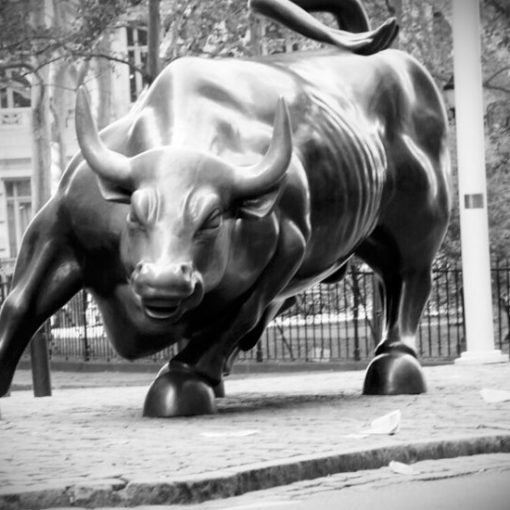By: Yale Bock, Y H & C Investments
The famous saying,” It is not over till it is over,” is typically applied to sports. Many fans have experienced a situation where the game is at the very end and one team is leading and all they have to do is finish the game with a final play to close the contest. Yet, the decisive moment often brings unpredictable endings that reverse which team ends up victorious. In many of these situations, one team appears dead. Done. Cooked. Forget about it.
The video above is from the 1977 National League Championship between the Los Angeles Dodgers and the Philadelphia Phillies. Both were legendary teams with well-known players. Each ultimately wound up winning a world championship in a later year. The Dodgers were my favorite team, and I was only ten years old, but I remember this game vividly. Nothing was happening. The Dodgers were dead, and the Philadelphia fans smelled victory. They were down to their last out and were trailing by two runs. They bring up a pinch hitter named Vic Davalillo, who I am pretty sure nobody has ever heard of. He gets on base with a drag bunt, and the Dodgers proceed to score three runs, take the lead, and win the game. So why do I bring this up?
In the business world, quality management teams have the ability to find ways to create value in unforeseen ways. It is often the case a company is viewed by the investment world as having limited growth prospects. Meanwhile, management is in the process of working on ways to completely change the business. One prominent example is when Apple had just been taken over by Tim Cook and was seen as a one product company with the iPhone. It was thought its best days were behind it because the growth of phone and tablet units was slowing. Over the next decade, products like a watch, air pods, subscriptions for music and video content, and payments from the Apple Wallet have added many billions of dollars of revenue for the company. Add-ons like insurance and warranties bring in more revenue. Investors who bought the stock when the sentiment was terrible were rewarded.
Another prominent example was Microsoft after it changed leadership and brought in Satya Nadella. He changed the focus of the company in a number of ways, including a heightened priority towards the cloud and enterprise segment and a more aggressive posture regarding capital allocation. Microsoft acquired LinkedIn and Activision and now appears well positioned because of its ownership and relationship with OpenAI (owner of ChatGPT). In the quick service restaurant area, both McDonald’s and Chipotle were in situations where the business was thought to have minimal growth prospects or trouble. New leadership was brought in and, over time, the businesses rebounded and flourished.
Personally, the example which impacted me the most is what Liberty Media has done with its equity pieces of various assets over a lengthy period of time. They had minority but prominent ownership in a wide variety of businesses. Liberty focused on a few areas where they had experience and could influence operations. In the cable business it is with Charter. In the satellite business, it was with DirectTv and SiriusXM. Looking at related areas, their holdings belong in the sports and media segment and include Formula One, Live Nation, and the Atlanta Braves. Finally, Liberty still owns the worst performer, which is the retail business of QVC. In terms of turning nothing into something, the Braves were a throw in as part of a deal with Rupert Murdoch. The Formula One stake was the byproduct of a lawsuit settlement with Vivendi. Liberty took those assets and made them into much stronger businesses with operational excellence.
My point for investors is management quality is always mentioned as a critical aspect for buying into a company. The description management quality, or high-quality management, is very vague, so let’s be more specific. High quality management is able to assess the resources of the company and find a way to work with those assets to unlock and build value. It usually does not happen in a week or two, or a month. Often it takes three to five years or more. Maybe assets are sold, and the cash is used to reposition into a different business.
Let’s take the case of Berkshire Hathaway, which was a cash and receivables rich textile company when Buffett bought it. In what was probably their most important move, they used the assets at Berkshire to enter into insurance, buying National Indemnity in 1967. Buffett and Munger then changed their ownership within Berkshire to get out of textiles and move towards branded consumer products like See’s Candy and then a billion-dollar investment in Coca-Cola in 1988. After the National Indemnity and See’s purchases, Buffett owned profitable businesses that provided him with consistent cash he could then deploy into stocks or buy more profitable businesses. In the case of Liberty, deals to swap minority positions into controllable assets in a tax efficient way are the standard method.
The ability to make something out of what appears to be nothing is not just important in sports. In the business world and investing, it probably is even more critical. It is never over till it is over.
Originally posted on August 13, 2025 on Y H & C Investment’s newsletter and blog
PHOTO CREDIT: https://www.shutterstock.com/g/Gajus
VIA SHUTTERSTOCK
DISCLOSURES
Y H & C Investments may have positions in companies mentioned in this newsletter. Nothing in the newsletter should be taken as an offer to buy or sell individual securities. It is the responsibility of each investor to research the investments mentioned so they can decide on the appropriateness and suitability of the investments consistent with their risk tolerance, risk constraints, and return objectives.
Past performance is no guarantee of future results, and all investments involve the risk of loss, including loss of principal and a reduction in earnings.



